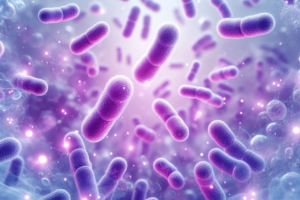Microbiome refers to the collective genomes of the micro-organisms in a very particular environment, and taking into consideration microbiota is the community of micro-organisms themselves. Approximately around 100 trillion micro-organisms (most of them bacteria, but also fungi, protozoa, and viruses) exist in the GI tract.2
What is gut microbiota?
Gut microbiota refers to the community of microorganisms that reside in the digestive tract, playing a vital role in regulating various bodily functions and maintaining overall health. This ecosystem is made up of a diverse range of microorganisms, including bacteria, viruses, fungi, and archaea. The composition of gut microbiota is influenced by various factors such as genetics, diet, lifestyle and environment. Recent research has shown that the gut microbiota is involved in many important physiological processes, such as digestion and absorption of nutrients, production of essential vitamins and metabolites, development and regulation of the immune system, and even influencing behavior and mood through the gut-brain axis. 3
The human gut is more complex and has a meaningful impact on general health. A very strong immune system, healthy brain, healthy heart, better mood, and effective digestion are all supported by a healthy gut. Additionally, it also helps in preventing several autoimmune diseases and cancers.
Functions of gut microbiota/flora:
The well-being of the gut flora is not only important for digestion, but it affects multiple processes, such as:
- The production of vitamins and minerals.
- Helping to create a real defensive barrier enabling it to protect from the attack of pathogens
- Positive interaction with cells that cover the inner wall of the intestine.
Diarrhea and the microbiota
Microbiota plays a very important role in regulating digestion, inflammation, metabolism and overall systemic responses in our body. When the gut microbiome becomes imbalanced (a condition termed gut dysbiosis) from bacterial overgrowth, it can result in a chronic bout of diarrhea. When the harmful bacteria begin to outnumber the beneficial bacteria in the body, the digestive tract will no longer be able to function normally. But unfortunately, any bout of either acute or chronic diarrhea can strip the bacteria in the gut and can result in gut dysbiosis, which can exacerbate the issue creating a very uncomfortable negative feedback loop. 4
Management 5
The management of patients with acute or chronic diarrhea begins with general measures such as fluid repletion and nutrition maintenance, with adjustments in the diet if required. Patients suffering from severe symptoms may benefit from symptomatic pharmacologic therapy. Antibiotic therapy is not indicated in most patients since the illness is usually self-limited.
Novel approach for the treatment is the use of probiotics, they are great for gut health and the digestive system. Mostly the reason being strains of good bacteria in probiotics have evolved to restore the balance by eliminating and out-competing the bad bacteria that may be causing diarrhea in the first place.
Probiotic products have microorganisms like bacteria or yeast in them. These are thought to reach the bowel, where their role is to suppress the pathogens that are causing diarrhea and help the body fight them. The best-known probiotics are lactic acid bacteria (lactobacilli). The source of this bacteria is in natural yogurt and a few other dairy products, as well as in some of the dietary supplements.
Types of diarrhea that respond to probiotic treatment
According to Healthline, there are mainly four types of diarrhea that can be mitigated with probiotics. Those include:6
- Antibiotic-associated diarrhea: Antibiotics can be one of the disruptors of a healthy gut microbiome, leading to diarrhea.
- Traveler’s diarrhea: This type of diarrhea while traveling is due to exposure to different microorganisms that an individual may usually come into contact with.
- Infectious diarrhea: There are around more than 20 different bacteria, viruses, and parasites that can lead to infectious diarrhea, such as Salmonella, E. coli,
- bacterial pneumonia and gastroenteritis. (are we talking of bacteria or infections? Confusing last line)
- Giardiasis: This is a diarrheal disease as a result of giardia, a microscopic parasite that lives in the intestines.
Probiotic strains that can treat diarrhea
There are several probiotic strains that can be helpful in treating diarrhea, including bifidobacterium, Lactobacillus, and Saccharomyces boulardii. Lactobacillus and Bifidobacterium are the most commonest strains of probiotics, and are most effective.
BLM LrGG contains L. rhamnosus GG (ATCC 53103) this is the world’s most researched and documented probiotic. It is globally recommended by several eminent authorities. It has clinically proven efficacy and safety in various gastrointestinal conditions, through multiple clinical trials. LrGG is proven safe to be used across all age groups ranging from kids to the elderly. It has been reported that LrGG could decrease the frequency and duration of diarrhea and vomiting and the recovery rate is 50% faster than the standard treatment of care.
BLM LrGG is available in form of Oromelt sachets and drops; following is the composition for the same:
1. Each Oromelt sachet contains
Lactobacillus rhamnosus GG (ATCC 53103) …. 6 billion CFU
2. Each 7 drops contain
Lactobacillus rhamnosus GG (ATCC 53103) …. 1 billion CFU
The recommended usage is one sachet a day or 7 drops a day.
BLM LrGG is indicated for prevention and treatment of antibiotic associated diarrhea and treatment of diarrhea in children. The benefits offered by the product are as follows
- helps in diarrhea
- improves digestion
- restores normal gut flora.
LrGG can be given to 24 hour old neonates!
- Clinically studied in various age group population starting from new born preterm infants to elderly population.
- Clinically studied at various dosage ranges starting from 120mn CFU to 2000 bn CFU per day.
Treatment recommendations for Paediatric Diarrhea
“Probiotics may be an effective adjunct to the management of diarrhea”.
- The guidelines (which?) recommend the use of specific probiotic strains, namely Lactobacillus rhamnosus GG (LGG) and Sacharomyces boulardii, for the
- management of children with acute gastroenteritis (AGE) as an adjunt to rehydration therapy. 7
- Lactobacillus rhamnosus GG (ATCC 53103) has a safe history of use since 1990.8
- Qualified presumption of safety (QPS) status from EFSA’s scientific Committee.9
- U.S. Food and Drug administration (FDA)- GRAS certificate.10
According to Clinical Guide to Probiotic Products Available in USA- 2023 Edition11
LrGG can have applications in the following areas:
- AAD – Antibiotic associated diarrhea – Prevention
- C – Constipation
- CID – Common infectious disease – community acquired
- IBS/FAP – Irritable bowel syndrome/Functional abdominal pain
- ID – Infectious diarrhea
Reference:
- Gut Microbiome – an overview | ScienceDirect Topics. (n.d). https://www.sciencedirect.com/topics/medicine-and-dentistry/gut-microbiome
- Valdes AM, Walter J, Segal E, Spector TD. Role of the gut microbiota in nutrition and health. Bmj. 2018 Jun 13;361.
- Yoo JY, Groer M, Dutra SV, Sarkar A, McSkimming DI. Gut microbiota and immune system interactions. Microorganisms. 2020 Dec 21;8(10):1587.
- Ursell LK, Metcalf JL, Parfrey LW, Knight R. Defining the human microbiome. Nutrition reviews. 2012 Aug 1;70(suppl_1):S38-44.
- https://www.uptodate.com/contents/approach-to-the-adult-with-acute-diarrhea-in-resource-rich-settings
- https://fitbiomics.com/blogs/news/probiotics-for-diarrhea
- https://www.medscape.com/viewarticle/913067
- Hibberd PL, Kleimola L, Fiorino AM, Botelho C, Haverkamp M, Andreyeva I, Poutsiaka D, Fraser C, Solano-Aguilar G, Snydman DR. No evidence of harms of
- probiotic Lactobacillus rhamnosus GG ATCC 53103 in healthy elderly—a phase I open label study to assess safety, tolerability and cytokine responses. PLoS One. 2014 Dec 1;9(12):e113456.
- https://www.efsa.europa.eu/en/efsajournal/pub/7747
- GRAS notice (GRN) No. 845 https://www.fda.gov/food/generally-recognized-safe-gras/gras-notice-inventory
- http://usprobioticguide.com/







